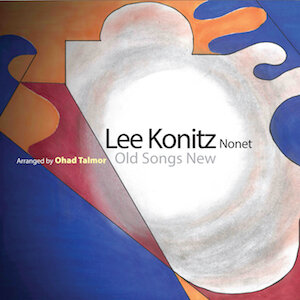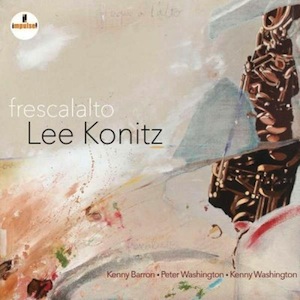Label: Sunnyside Records, 2019
Personnel - Lee Konitz: alto saxophone; Ohad Talmor: arranger, conductor, tenor saxophone; Caroline Davis: flutes; Christof Knoche: clarinet; Denis Lee: bass clarinet; Judith Insell: viola; Mariel Roberts: cello; Dimos Goudaroulis: cello; Christopher Tordini: bass; George Schuller: drums.
The unmatchable 90-year-old alto saxophonist Lee Konitz, a living legend whose full and lush sound never ceased to create impact, revisits the nonet format on Old Songs New, his latest release on the Sunnyside imprint. The album’s arrangements have the distinguished signature of a former pupil and frequent collaborator, tenor saxophonist Ohad Talmor, who also conducts and contributes reed lines on “I Cover the Waterfront”, a serene classic that shows Konitz’s respect for the melodic persuasion of Frank Sinatra. The influence of this singer in the saxophonist’s playing is also noticeable during the balladic enchantment of “In The Wee Small Hours of the Morning”.
In addition to a dynamic trio of strings (two cellos and a violin), the session relies on credible musicians such as Caroline Davis, whose flute sinuosities are vital on “Foolin’ Myself”, a piece that grooves high with the vivacity of swing and a melodicism that magnifies the spirit of the old times. The pattern combinations from bass clarinetist Denis Lee, a devoted ally, and clarinetist Christof Knoche are also traceable here.
Accessible and refreshing is Gordon Jenkins’ “Goodbye”, which opens the recording with bemused candor - some chamber horn inclinations, skilled brushed drumming, and confident walking bass. The veteran bandleader wears the unique colors that made his sound and language landmarks in jazz, and the tune’s ending is akin to a soft landing.
Fluid strains of modern bebop travel “Kary’s Trance” with emotion and dexterity. Konitz wrote this piece for his daughter and its first recording occurred in 1956 on the album Inside Hi-Fi. Thus, in opposition to the remaining tunes, this piece was recorded many times before. However, in its newest version, the song is dressed with fresh, colorful garments, maintaining the 4/4 and 3/4 time signatures and containing interesting passages where the brightness of the alto sax is set against the darker toned hues generated by the strings.
Other interpretations of standards such as “This Is Always” and “You Go To My Head” have this appealingly loose grip that differs from the narratives presented in the 50’s. Both pieces magnify the melody on top of a vibrant collective chemistry.
The session ends with another original, “Trio Blues”, whose title says everything (a blues form approached in the classic sax/bass/drums configuration) except that this is an extemporaneous exercise. Bassist Chris Tordini and drummer George Schuller excel in their actions.
Continuing to benefit from an embouchure of his own, Konitz stands as one of the most admired jazz influencers of our times. His facility in developing melody with unexpected stabbing notes has a refreshingly positive effect. As a result, traditional jazz enthusiasts and post-bop loyalists should be on cloud nine.
Grade B+
Favorite Tracks:
01 - Goodbye ► 02 - Foolin’ Myself ► 04 - Kary’s Trance






